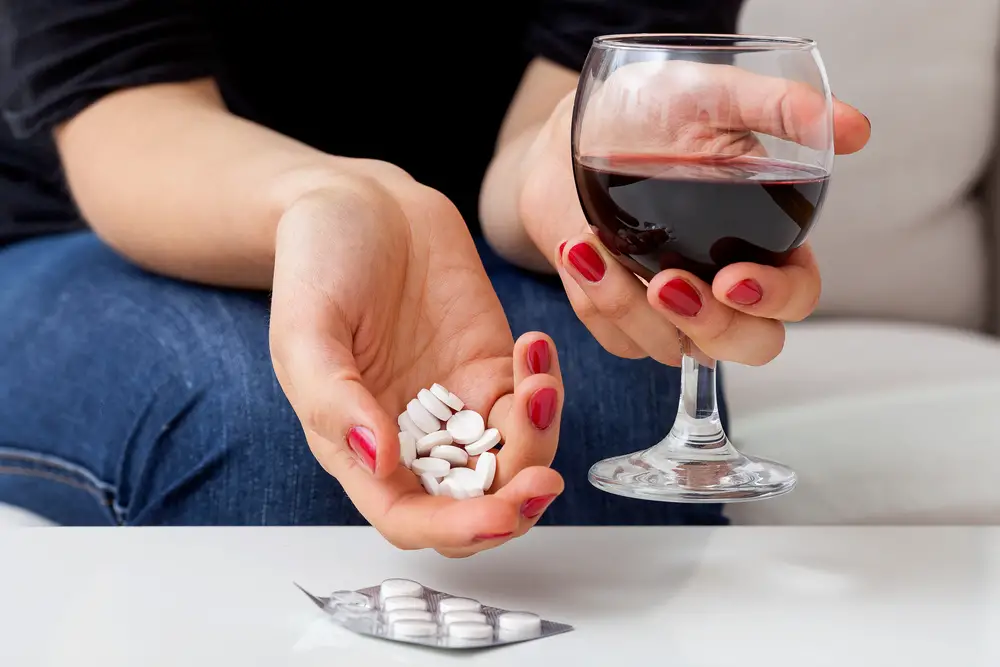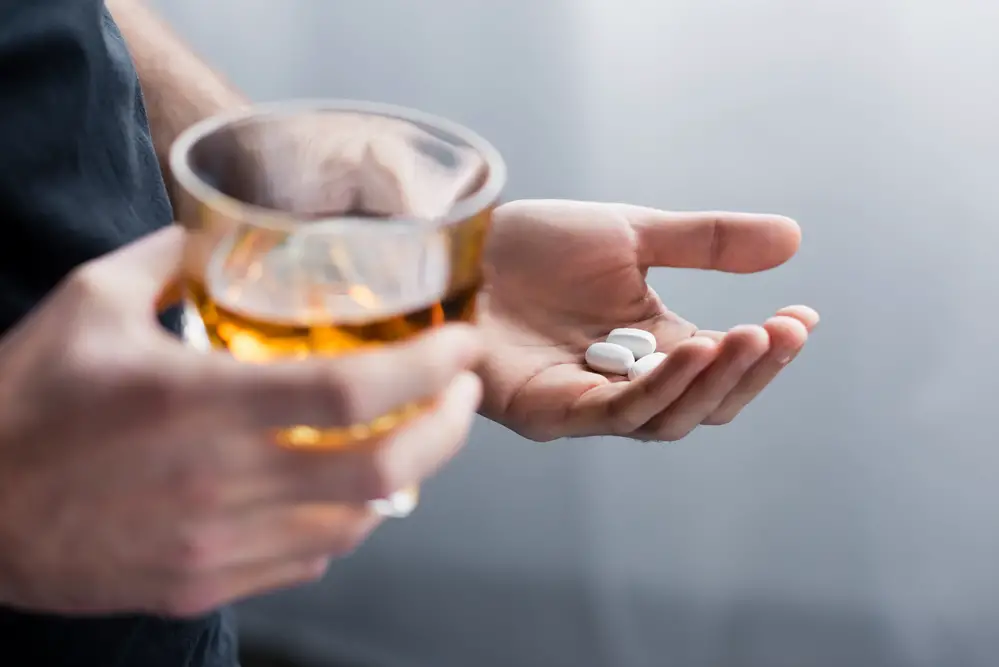Are you aware that drinking alcohol while taking antibiotics can have different effects on the body, interactions, and potential risks? Therefore, understanding the effect of alcohol on antibiotics is critical to ensuring safe and effective treatment.
This article will explore the effects of alcohol on antibiotics, the reasons for these interactions, and provide guidance on what to do when combining alcohol and antibiotics. By following medical advice and being informed, individuals can make informed decisions and minimize potential harm.
Table of Contents
ToggleCan You Drink Alcohol On Antibiotics?
Mixing alcohol with antibiotics may not make the antibiotics less effective, but it can cause side effects and interfere with the body’s natural healing ability.
Drinking alcohol while taking antibiotics can lead to dehydration, stomach distress, disrupted sleep, and a reduced immune system. Before consuming alcohol while taking antibiotics, it’s crucial to check with a doctor or pharmacist because some medicines might be hazardous to the liver.
On prescription drug bottles, “Avoid alcohol” warns are frequently printed to prevent alcohol and antibiotic intoxication. Alcohol and several antibiotics, including metronidazole and tinidazole, might interact negatively, resulting in discomfort, nausea, sleepiness, and other unpleasant symptoms. The best course of action is to abstain from alcohol during therapy and a few days after.
Alcohol and other antibiotics can interact, albeit typically less negatively. Alcohol should not be consumed while taking antibiotics unless specifically advised by a physician.
What Happens When You Drink Alcohol On Antibiotics?

Drinking alcohol while taking antibiotics can result in side effects such as nausea, flushing, vomiting, stomach pain, and liver damage, as well as diminish the antibiotic’s efficacy or increase its toxicity.
Due to alcohol’s involvement with metabolism, some antibiotics may not function as intended or because more harm. Here are a few medical issues that can develop from consuming alcohol while taking antibiotics.
1. Central Nervous System (CNS) Side Effects
It is well known that alcohol slows down the central nervous system. Some antibiotics, such as metronidazole (Flagyl), can adversely affect the central nervous system.
- Drowsiness
- Dizziness
- Sedation
- Confusion
These effects may be considered when driving or operating machinery, especially in elderly people or patients using other CNS depressants such as opioid analgesics, muscle relaxants, antidepressants, anxiolytics, or seizure medications.
2. Liver damage
Alcohol abuse is known to harm the liver and lead to conditions like cirrhosis. Using antibiotics that can harm the liver can exacerbate these issues.
3. Stomach Side Effects
Antibiotic use can also lead to gastrointestinal issues like nausea, vomiting, diarrhea, and stomach pain. Alcohol use can exacerbate these adverse gastric effects.
4. Disulfiram-like Reaction
Alcohol and the antibiotic metronidazole often interact, which might result in a “disulfiram-like reaction.” The following signs could show up.
- Nausea
- Blushing
- Vomiting
- Headache
- Stomach ache
- Rapid heartbeat
- Chest pain
- Difficulty breathing
What To Do After Drinking Alcohol On Antibiotics?

- For information on drinking with antibiotics, look at the warning label. If you have questions regarding the specifics of your medication, speak with your doctor or pharmacist.
- Your doctor may approve the occasional use of alcohol, depending on your age, general health, and type of antibiotic.
- Ask your doctor how long you should wait before drinking alcohol again if they advise against it. It might be necessary to hold off for at least 72 hours after finishing the antibiotic course.
- You can lessen the consequences of an alcohol-drug interaction according to your doctor’s or pharmacist’s recommendations.
Antibiotics With Alcohol
Some important antibiotics with alcohol drug interactions are listed below.
| Drug | Effect with Alcohol | Recommendation |
| trimethoprim/sulfamethoxazol | Symptoms may include a fast heartbeat, a feeling of numbness, vomiting, nausea, and redness under your skin | When taking trimethoprim/sulfamethoxazole, stay away from alcohol |
| Linezolid | Increased risk of hypertensive crisis (dangerously high blood pressure) | Red wine, tap beer, vermouth, and other alcoholic beverages that contain tyramine should also be avoided in significant quantities |
| Metronidazole | Abdominal cramps, vomiting, nauseousness, headaches, and flushing are possible disulfiram-like reactionsSystemic vaginal cream absorption is also a possibility | During treatment and for 72 hours after stopping metronidazole medication, avoid combining with products that include alcohol or propylene glycol |
| Cefotetan | Symptoms of a disulfiram-like reaction include abdominal cramping, nausea, vomiting, migraines, and flushing | During treatment and for 72 hours after ceasing cefotetan medication, avoid combining it with alcohol |
| Tinidazole | Reactions like those caused by disulfiram may include stomach cramps, headaches, nausea, vomiting, and redness | While receiving treatment and for 72 hours following tinidazole treatment interruption, avoid combining with alcohol or propylene glycol |
Why Do Interactions Occur After Drinking Alcohol On Antibiotics?
- There are interactions because the enzymes responsible for alcohol metabolism in the body are also involved in the metabolism of certain antibiotics.
- These enzymes can be inhibited by alcohol, which interferes with the correct metabolism of antibiotics and raises the possibility of adverse effects.
- When both alcohol and antibiotics have side effects, additive consequences may happen. Antibiotics like metronidazole and those that upset the stomach, for instance, can amplify these effects when coupled with alcohol.
- Combining alcohol and some antibiotics can lead to poor coordination, mishaps, and excruciating agony.
In general, it is advised to refrain from consuming alcohol when ill, especially if you are taking antibiotics or other medications. The greatest strategy to prevent future issues is to get assistance from a healthcare practitioner and heed their counsel.
Conclusion
Due to the potential interactions and dangers, it is crucial to avoid taking alcohol when using antibiotics. Negative side effects from combining alcohol and antibiotics include dehydration, gastrointestinal discomfort, disturbed sleep, and a reduced immune system.
Some antibiotics are metabolized by the same enzymes implicated in the metabolism of alcohol, and alcohol can block these enzymes, preventing adequate antibiotic metabolism and raising the risk of side effects. Additionally, taking certain antibiotics like metronidazole with alcohol might cause unpleasant side effects similar to disulfiram.
It is essential to adhere to medical professionals’ recommendations, refrain from drinking throughout therapy, and speak with a doctor or pharmacist if you have any concerns or questions to guarantee a safe and effective course of treatment. People can reduce the potential hazards of consuming alcohol while taking antibiotics and improve their general well-being by being knowledgeable and cautious.

I am a passionate beer connoisseur with a deep appreciation for the art and science of brewing. With years of experience tasting and evaluating various beers, I love to share my opinions and insights with others and I am always eager to engage in lively discussions about my favorite beverage.

















